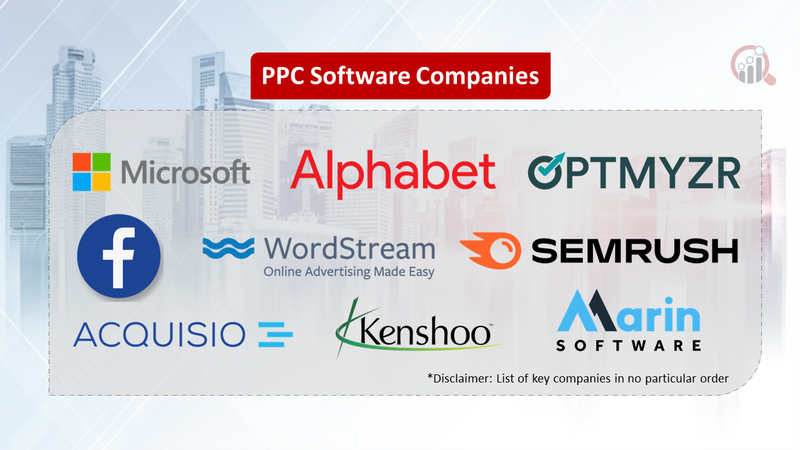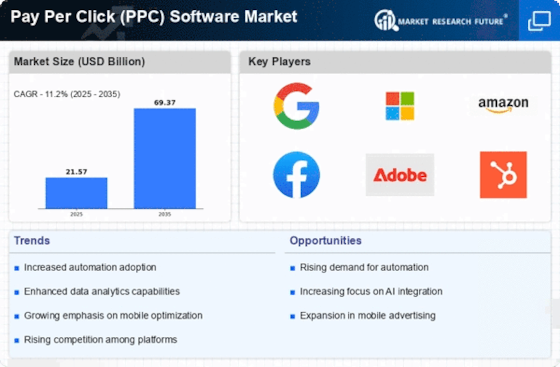Top Industry Leaders in the Pay Per Click (PPC) Software Market

Competitive Landscape of PPC Software Market:
The Pay-Per-Click (PPC) software market is a thriving domain within the digital advertising ecosystem. This dynamic landscape is populated by a diverse range of players, each vying for market share through distinct strategies and offerings. Analyzing these players and their approaches is crucial for understanding the current competitive dynamics and informing future success in this sector.
Key Players:
- Alphabet Inc. (Google LLC) (California, United States)
- Microsoft Corporation (New Mexico, United States)
- Facebook, Inc. (California, United States)
- WordStream (Massachusetts, United States)
- Optmyzr (California, United States)
- SEMrush (Massachusetts, United States)
- Acquisio (Brossard, Canada)
- Kenshoo, Ltd. (Tel Aviv-Yafo, Israel)
- Marin Software (California, United States)
- Spaceboost (Barcelona, Spain)
- Adzooma (Nottingham, England)
- AdStage, Inc. (California, United States)
- SpyFu (Arizona, United States)
- Adalysis Limited (London, England)
New Entrants and Niche Specialists:
However, the market is not stagnant. Recent years have seen the emergence of new players like AdStage, Optmyzr, and TapClicks, who challenge the status quo with innovative features and tailored solutions. These companies often focus on specific industries or campaign types, offering advanced capabilities in areas like AmazonPPC, mobile advertising, or local search. Their agility and laser focus on niche segments allow them to attract specialized clientele and carve out significant market share.
Strategies for Success:
The competitive landscape within the PPC software market is driven by several key factors:
- Product Innovation: Constant advancements in AI, automation, and data analytics are shaping the market. Players strive to offer AI-powered bidding strategies, campaign optimization algorithms, and advanced reporting tools to deliver superior ROI and optimize ad spend.
- Pricing Models: Different pricing strategies can be observed, with some players opting for subscription-based models, while others charge based on ad spend or campaign complexity. Finding the right balance between affordability and value becomes crucial for attracting and retaining customers.
- Partnerships and Integrations: Strategic partnerships with advertising platforms, data providers, and other ad-tech players can significantly enhance a PPC software's capabilities and reach. Integration with complementary tools allows for smoother workflows and streamlined campaign management.
- User Experience and Support: Delivering a user-friendly interface, intuitive navigation, and comprehensive support resources is essential for attracting and retaining users in a technically demanding sector.
Market Share Analysis Factors:
Evaluating market share in the PPC software market requires a nuanced approach, considering factors beyond just revenue figures. Some important metrics include:
- Number of active clients: This reflects the reach and user base of a PPC software platform.
- Client size and spend: Understanding the types of customers a platform caters to, ranging from small businesses to large enterprises, paints a picture of its market footprint.
- Campaign complexity and diversity: The ability to handle complex campaigns across various platforms and ad types indicates a platform's versatility and appeal to a broader market segment.
- Customer satisfaction and retention rates: Positive reviews, high renewal rates, and low churn demonstrate a platform's ability to deliver value and meet user expectations.
Current Investment Trends:
PPC software companies are actively attracting investments to fuel further growth and market penetration. Emerging trends in funding include:
- Focus on AI and machine learning: Investors are increasingly interested in platforms leveraging AI for campaign optimization, bidding automation, and data-driven insights.
- Consolidation and acquisitions: Larger players are eyeing strategic acquisitions to expand their offerings, acquire new client bases, and enter new market segments.
- Focus on automation and self-service tools: Investors are drawn to platforms that empower marketers with streamlined workflows and self-service functionalities, reducing dependency on human intervention.
Latest Company Updates:
January 9, 2024, Microsoft Advertising announced the launch of Audience Insights, a new tool that provides advertisers with detailed data on their target audiences. This helps create more effective and targeted campaigns.
December 5, 2023, Google Ads launched Smart Bidding Enhancements, a new feature that automatically adjusts bids based on multiple factors beyond just conversions. This aims to improve campaign performance and efficiency.










